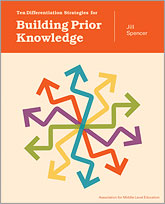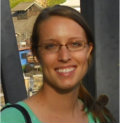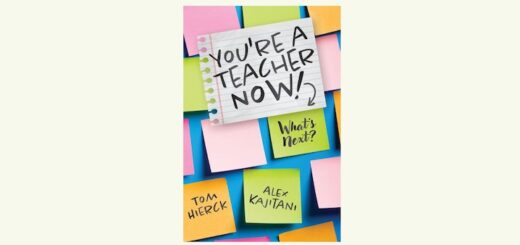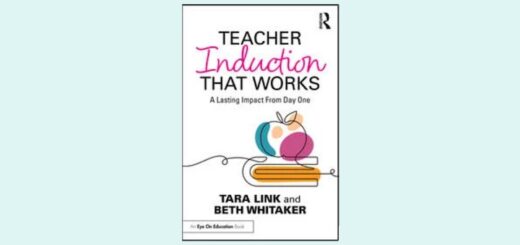Building Background Knowledge
Ten Differentiation Strategies for Building Prior Knowledge
By Jill Spencer
(Association for Middle Level Education, 2012 – Learn more)
As I sat in a faculty meeting two weeks ago, I listened to my principal relay information on the findings from several classroom visits done by our district office employees. “They want more differentiation,” he explained as he looked at the list of items targeted for improvement.
If you are anything like me, you’ve heard that word “differentiation” used many times in many different ways. I’ve wondered: What does differentiation really mean? And what exactly are they expecting to find when they look for it in our classrooms?
In her book Ten Differentiation Strategies for Building Prior Knowledge, Jill Spencer makes this point: “Differentiation is a word that is bandied around as if educators, parents, and students all share the same definition. We don’t!” From there, she goes on to offer her explanation of what it means to differentiate instruction, and why it’s an important practice in today’s classrooms.
 Differentiation and more
Differentiation and more
When choosing to do a review of Spencer’s book, differentiation in the title didn’t catch my eye, but rather the idea of background knowledge. In hopes of increasing my students’ retention of the material I taught, I wanted to more heavily focus my attention on the beginning of my lesson/unit instead of the end, with such tools as reviewing.
There’s enough in this book to meet my current needs and expand my thinking. As Jill Spencer explains, “The purpose…is to share 10 strategies that will help you access, build, and/or assess prior knowledge in a differentiated manner so that you get the feedback you need to thoughtfully move forward in your planning.”
This book isn’t only directed to teachers who are starting to differentiate instruction, but for any teacher who wants to try new strategies, have a classroom engaged in the digital world, or find more ways to tap into student background knowledge. She is hopeful that Building Prior Knowledge will be the first in a series to help teachers plan their lessons/units to address student learning needs and preferences.
Well-organized information
Ten Differentiation Strategies for Building Prior Knowledge is broken down into three sections: Four ways to differentiate, FAQs about prior knowledge, and 10 strategies for activating, building, and assessing prior knowledge. The third section fills most of the book’s pages, where Spencer explains each of the ten strategies in detail. Each strategy has a short description, its purpose, how it differentiates, the procedures associated with it, three content examples, and its benefits. The content examples are extremely informative on how to apply each strategy and how to use it in different ways. As a science teacher, I appreciated her use of many science content examples. I even used one of the strategies the following week after reading about it. It went very well.
Technology integration
Another perk of the book is that Jill suggests several ways to implement technology in concert with the 10 strategies. Since many students are daily users of technology outside the classroom, and more schools are becoming technologically equipped, strategies for integrating technology into lessons are more in demand. Some of her suggestions for bringing this technology into the classroom are podcasts, wikis, Flickr, and clicker systems.
Final thoughts
This is a good and useful book and a quick read. Spencer’s strategies are easy to implement and modify to fit your student’s needs. Her thoughts on differentiation and prior knowledge are insightful. The book was a great help in my search for ideas on how to effectively assess my student’s background knowledge. I plan to use more of her suggestions in future lessons.
Two final thoughts from Jill Spencer: “If time isn’t spent up front, it will be spent on the tail end of a lesson or unit when students cannot demonstrate mastery.” And always remember: “Teaching and learning should be joyous processes.”
Lucille Schauer teaches 7th grade science in South Carolina. She earned her BA in middle childhood education from Wittenberg University. She received Wittenberg’s Excellence in Pre-service Teaching Award and was later chosen her school’s rookie teacher of year. She resides in Wallace, SC with her husband.


































